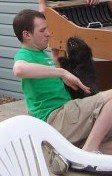My family, which happens to include myself, is from open sunsets, white noise train incidents, black summers, frozen grass tips, biblical figures walking lonely street sides, and forgotten reckonings. We are secret people, lake side wonderers, tossing face coins into gutters, waiting for the rain. We are the figures of Nordic heritance and North American outlines, forgotten and remembered. Our people are not people, but folks, and are proud to wear suspenders and stained hats.
My family language derives from the past, from the tradition of traditions, and it revolves around the inheritance of lost understandings. We talk as if it is who we are, which might be a revolution. We tell jokes that have been told, and laugh at the remembrance of the first telling. Ollie and Lena are not fictional characters; the repetition of jokes has brought them to life. We make tales that become true, the alternatives fade.
-------------------------------------------------------------------------------------------------------
“Did you hear how North Dakota was named?”
“Yes, father.”
“Well, let me tell you then. There was this young fellow, a lad just entering the job industry, and he was assigned the duty of naming two empty blocks of country. He pressed his mind and it continued to fill with nothings. As the days passed, and as his deadline approached, he began to panic. There were so many wonderful names for the other states, Colorado, Mississippi, and California for example. He decided to try and relax.
The young lad entered the local tavern, and sat down, ordering a dark beer. He drank softly, listening to the commotion of the bar. Behind him was a table full of men playing intensive games of poker. At the table sat the town doctor, an Indian named Ta, and the county practitioner. Ta and the Doc were in the middle of an argument.
‘I did not say such a thing sir,’ Doc said to the Indian.
The young lad listened in closer. Apparently, the Doc had bet his horse over a game of cards and had lost. The lad exchanged glances with the bartender as the argument heated up.
‘I said I did not say such a thing sir.’ The Doc said, throwing down his cards, standing up, and throwing his jacket over his shoulder. Ta, the Indian stood, flipping the table with his movement.
‘Yea did. Horse mine. Doc owe Ta.’
As the Indian’s words filled the bar, and a fight ensued, the young lad sitting at the bar had a revelation.
‘Doc-owe-ta,’ he said to himself. ‘Dakota…that is what I will name them. North and South Dakota.’
Well, son, that is the story of how North Dakota was named. The land from which you hail is named after a bar fight.”
I smiled as my father told the story.
We come from fictional bar fights, from foreign sayings, and tear drop islands. We are a repetition of important jokes, old sayings, and continued tradition. My family is torn secrets, long stories, and televisions with three working channels. Our sayings are ours, and cannot live outside of a family belonging. We are the Schnickels, our language and sayings as strange as our name.
Monday, September 1, 2008
Subscribe to:
Post Comments (Atom)

1 comment:
Wow Luke, I loved the opening of your post. The language you used speaks directly to the power and depth of your family heritage. Without saying directly where your from or who you are speaking about, a million thoughts and images appear in my mind.
I had no idea how it was named, but I will tell your story to everyone I know.
Your language and sayings are as strange as your name, but I'm sure glad I read your post
Post a Comment